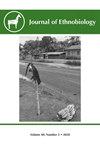票价、消费者需求、社会地位、种族和加州鲍鱼的崩溃
IF 1.3
3区 社会学
Q1 ANTHROPOLOGY
引用次数: 1
摘要
摘要至少从19世纪中期开始,加州的太平洋海岸就一直是全球商业捕鱼活动的中心。然而,数十年的密集捕捞、污染、人为气候变化和疾病,已经导致该州许多最重要、最有利可图的渔业崩溃。许多旨在了解这场海洋危机的过程和后果的研究都集中在生产问题上——生活在海洋中和从海洋中捕捞的鱼类的数量。在这里,我们将注意力转向消费问题,并探讨市场力量、地位、种族和不断变化的食物观念如何导致渔业崩溃。我们以加州鲍鱼(Haliotis spp.)渔业的兴衰为例进行研究,并从1901年至2005年期间主要在南加州的账单中收集鲍鱼菜肴的价格数据。我们探讨了鲍鱼菜肴的餐厅价格在上个世纪如何以及为什么发生了变化,以及消费者需求(或口味)和社会地位在影响鱼类种群健康和稳定方面的作用。本文章由计算机程序翻译,如有差异,请以英文原文为准。
Bills of Fare, Consumer Demand, Social Status, Ethnicity, and the Collapse of California Abalone
Abstract. Since at least the mid-nineteenth century, California's Pacific Coast has been an epicenter of global commercial fishing activities. Decades of intensive harvest, pollution, anthropogenic climate change, and disease, however, have resulted in the collapse of many of the state's most important and profitable fisheries. Much of the research designed to understand the processes and consequences of this crisis of the oceans has focused on production issues—the number of fish that live in and are harvested from the ocean. Here, we turn our attention to consumption issues and explore how market-forces, status, ethnicity, and evolving perceptions of food can drive fisheries collapse. We use the rise and fall of the California abalone (Haliotis spp.) fishery as a case study and compile data on the price of abalone dishes from bills of fare, primarily in southern California, dating between 1901 and 2005. We explore how and why restaurant prices for abalone dishes changed over the last century and the role of consumer demand (or taste) and social status in influencing the health and stability of fish stocks.
求助全文
通过发布文献求助,成功后即可免费获取论文全文。
去求助
来源期刊

Journal of Ethnobiology
Social Sciences-Anthropology
CiteScore
4.80
自引率
3.40%
发文量
21
审稿时长
>12 weeks
期刊介绍:
JoE’s readership is as wide and diverse as ethnobiology itself, with readers spanning from both the natural and social sciences. Not surprisingly, a glance at the papers published in the Journal reveals the depth and breadth of topics, extending from studies in archaeology and the origins of agriculture, to folk classification systems, to food composition, plants, birds, mammals, fungi and everything in between.
Research areas published in JoE include but are not limited to neo- and paleo-ethnobiology, zooarchaeology, ethnobotany, ethnozoology, ethnopharmacology, ethnoecology, linguistic ethnobiology, human paleoecology, and many other related fields of study within anthropology and biology, such as taxonomy, conservation biology, ethnography, political ecology, and cognitive and cultural anthropology.
JoE does not limit itself to a single perspective, approach or discipline, but seeks to represent the full spectrum and wide diversity of the field of ethnobiology, including cognitive, symbolic, linguistic, ecological, and economic aspects of human interactions with our living world. Articles that significantly advance ethnobiological theory and/or methodology are particularly welcome, as well as studies bridging across disciplines and knowledge systems. JoE does not publish uncontextualized data such as species lists; appropriate submissions must elaborate on the ethnobiological context of findings.
 求助内容:
求助内容: 应助结果提醒方式:
应助结果提醒方式:


